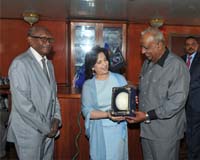Contact Center
.
20 February 2015
H.E Says at Al-Tayeb Salih International Award for Creative Writing: “Intellectuals are the true wealth of the nation.”


Bahrain Culture and Antiquities Authority (BCAA) President, the guest of honor of al-Tayeb Salih International Award for Creative Writing, H.E Shaikha Mai bint Mohammad al-Khalifa, said that the men of letters and intellectuals are the true wealth of the Arab world and the best ambassadors representing the human race, just as Tayeb Salih represented and reflected Arab and African cultures in his works. The winners have been announced on 19th February 2015 at a ceremony organized at the Friendship Hall and attended by the assistant of the president of the Republic Prof. Ibrahim Gandour, ex-vice president Ali Osman Mohamed Taha, Minister of Investment Mustafa Ismael, Mohamed Al Khalifa, State Minister for Culture Mustafa Tairab, several Arab intellectuals and foreign diplomats.
H.E Shaikha Mai highlighted the importance of investing in culture in her inaugural speech, lauding the role played by Zain Mobile Communication Company to encourage and sponsor Arab intellectuals, uplifting the banner of literature and the arts in Sudan and the Arab World. Arbitration Committee representative, Mohammad Al-Bedoui, also highly valued Zain Mobile Communication Company for organizing this award in commemoration of the renowned late Sudanese writer. Indeed, Tayeb Salih’s novel, Season of Migration to the North, is chosen among the 100 greatest books in world history and it has played a major role in highlighting Sudanese culture and writings in the international arena.
The award was launched by The Sudanese Company for Mobile Phone (Zain) in 2010 to mark the first anniversary of the passing away of outstanding Sudanese novelist al-Tayeb Salih and has continued to be organized annually. It covers the areas of novels and short stories. It also covers a third literary domain to be specified annually by the Award's Council of Trustees.
The Award's Council of Trustees said this 2015 session had attracted a select group of such outstanding men and women of letters from around the Arab World and the world at large. The list has embraced notable Algerian novelist Wasini al -Araj , widely published Egyptian poet Ahmad Abdul-Mu'ti Hijazi, poet and novelist Ibrahim Nasralla from Palestine, writer Mohammad al-Badawi from Tunisia , Egyptian poet Dr. Hasan Talab, poet Ms. Hamda Khamees from the United Arab Emirates (U.A.E), novelist Ms. Rasha Nasir al-Ali from Syria and Sudanese novelist Layla Abu-El-Ela (residing in UK). The Council hailed the group for their invaluable participation in the judging panel, symposiums and other related activities.
The first prizes of al-Tayeb Salih International Award for Creative Writing have gone to Ms. Wiam Hassan al-Madadi, from Morocco, for her novel The Gypsy, Rasim Gasim Musa, from Iraq and Hassan Ibrahim Hassan from Syria for novel, short story and poetry categories respectively.
Two Sudanese writers won the second and third prizes of the novel category; Husham Adam Mohamed and Isam Omer Ibrahim for Kjumi, while Yousuf Abd al-Jaleel al-Atta won the second prize in the short story category. Ismael Obied Sayah (Iraq) and Farras Farzat al-Qatan (Syria) won the second and third prizes for poetry while the third prize for short story went to Mohamed Abbas Ali (Egypt) for Fatma Lives.
The Sudanese poet Abdalla Shabo has been awarded the Person of the Year's prize for his lifetime literary achievements including poetry, writing, and translation of literary works of many of the world's famous poets such as Chilean poet Pablo Neruda and Spanish poet Garcia Lorca. Trustee Council Member, Sudanese novelist Ibrahim Ishag said the contest this year had attracted an overall 708 contenders including 335 poets, 253 short story writers and 120 novelists from 21 Arab and African countries and from India, the U.K, Australia, France and Turkey. Sudanese novelists and poets have topped the list of contenders, presenting 114 works of poetry, 83 short story collections, and 36 novels.
There is no doubt Tayeb Salih's novel presents the political side of confrontation between cultures. Issue of cultural identity, raised as a result of encounter of the western and eastern values, is written with particular acuteness. According to Amin Maalouf, people’s feelings towards their native land, which they have to leave, are not easy to experience. They leave relatives in the country they are abandoning and they reproach themselves for this constantly, they abandon their homes where they were brought up, they abandon their sweet memories. There also exists a feeling of being attached to the native land and this feeling is very deep-rooted in these people.







